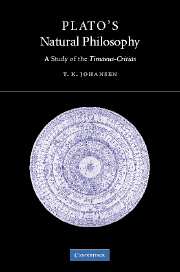Book contents
- Frontmatter
- Contents
- Acknowledgements
- Introduction: Plato's tales of teleology
- 1 What is the Timaeus-Critias about?
- 2 The status of the Atlantis story
- 3 The status of Timaeus' account
- 4 Teleology and craftsmanship
- 5 Necessity and teleology
- 6 Space and motion
- 7 Body, soul, and tripartition
- 8 Perception and cosmology
- 9 Dialogue and dialectic
- Epilogue
- Bibliography
- General index
- Index locorum
6 - Space and motion
Published online by Cambridge University Press: 03 September 2009
- Frontmatter
- Contents
- Acknowledgements
- Introduction: Plato's tales of teleology
- 1 What is the Timaeus-Critias about?
- 2 The status of the Atlantis story
- 3 The status of Timaeus' account
- 4 Teleology and craftsmanship
- 5 Necessity and teleology
- 6 Space and motion
- 7 Body, soul, and tripartition
- 8 Perception and cosmology
- 9 Dialogue and dialectic
- Epilogue
- Bibliography
- General index
- Index locorum
Summary
The last chapter argued that necessity arose out of the nature of the simple bodies in conjunction with the receptacle. The receptacle played an important role in accounting for the necessary motions, particularly in explaining why bodies with like natures move towards each other. However, it would be a mistake to think of necessity as simply emerging out of the receptacle as such. For, I argued, the pre-cosmic receptacle does not on its own support the notion of necessity. This chapter considers Timaeus' account of the receptacle in more detail. In the process, it should become clearer how Timaeus distinguishes the states of the receptacle after and before the creation of the cosmos and thus how he sees the difference between a world that is governed by teleology and one that is not.
At 48e Timaeus says that you need three basic principles to explain the cosmos. Two of these, the notions of being and becoming, we are already familiar with from the beginning of this dialogue and from other Platonic dialogues. But now Timaeus adds a third principle, that of the receptacle of coming-into-being. What exactly Timaeus means by the receptacle has been debated since antiquity. Does he mean the matter out of which physical things are composed, as Aristotle suggested? Or does he mean the space in which physical objects are located? Timaeus himself calls the receptacle ‘space’ (chōra), but never ‘matter’ (hulē). However, this fact hardly settles the question.
- Type
- Chapter
- Information
- Plato's Natural PhilosophyA Study of the Timaeus-Critias, pp. 117 - 136Publisher: Cambridge University PressPrint publication year: 2004

